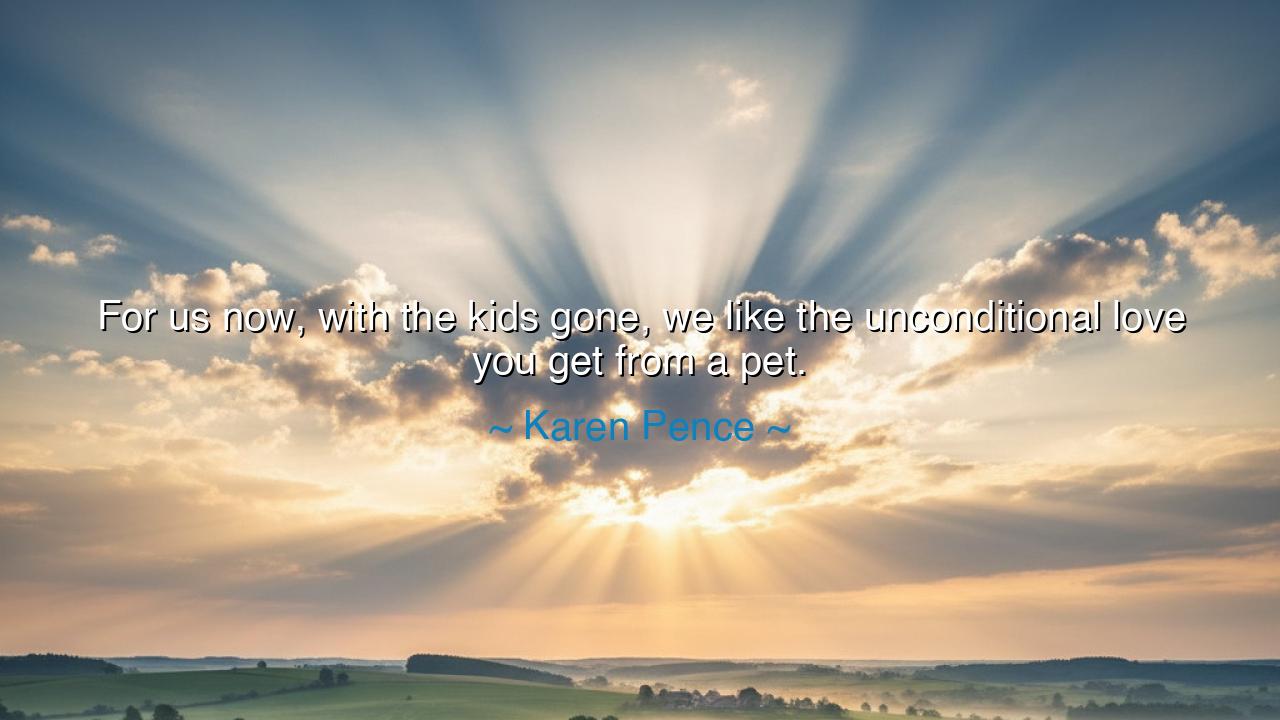
For us now, with the kids gone, we like the unconditional love






The gentle voice of Karen Pence once carried this truth: “For us now, with the kids gone, we like the unconditional love you get from a pet.” Though spoken in the quiet context of family life, these words resound with eternal wisdom. They speak of the seasons of existence, of the shifting roles of parenthood, and of the healing comfort offered by the faithful presence of animals. In them we hear the longing of the empty house, the silence left when children grow and walk their own paths, and the solace found in the steady devotion of a pet whose heart knows no condition.
When she says, “with the kids gone,” she evokes a truth that every parent must one day face: the home, once filled with laughter, footsteps, and voices, becomes silent. The bustling rhythm of family life yields to stillness. It is not sorrow only, but a natural turning of the wheel, a reminder that love, when true, prepares others to leave. Yet silence can weigh heavy. It is in such a season that companionship becomes most precious, and where animals—loyal, constant, and unjudging—become balm to the heart.
The phrase “unconditional love” is the heart of her reflection. Children, though they love, eventually grow independent, questioning, choosing their own ways. Human love, beautiful as it is, often carries complexity, expectation, and struggle. But the love of a dog, a cat, or any faithful animal does not waver. It does not measure, it does not bargain, it does not turn away when times grow weary. The ancients, too, honored this bond; in Egypt, cats were revered as protectors, and in Rome, dogs were praised as guardians and companions. The constancy of animals was seen as divine reflection—a love uncorrupted by pride.
History offers us a poignant example in the tale of Greyfriars Bobby, the little dog in Scotland who kept vigil for fourteen years at the grave of his master. Through storm and snow, through day and night, Bobby’s loyalty never faltered. Villagers came to know him as more than a beast; they called him a friend, a symbol of faithfulness when all else fades. So too, Karen Pence’s words remind us that in the silence of the empty home, the devotion of a pet rekindles warmth and offers a love that requires nothing but presence.
The origin of her statement lies in the cycle of family life. For parents, the raising of children is an all-consuming task, filled with duty and joy. Yet when the children depart, the parents are left with themselves once more, standing where they began but changed by years of love and sacrifice. In this return to simplicity, the companionship of an animal provides continuity, a daily reminder of love without complexity, of joy in small things, of presence that fills the quiet.
The lesson for us is clear: life is made of seasons, and in each season, new forms of love arise to sustain us. When family fills the home, cherish its noise and chaos. When silence descends, do not despair, but seek companionship where it may be found—whether in pets, in friendships, or in acts of service. And above all, remember that love, in its purest form, is not bound by condition or expectation. The more we give, the more it multiplies, flowing back to us in ways unexpected.
Practical action follows. Care for the animals entrusted to you, for in their devotion lies a mirror of eternity. Do not dismiss their companionship as lesser than human love, for many hearts have been healed by the loyalty of creatures. If loneliness falls upon you, do not harden yourself, but open your heart to receive love wherever it appears—be it in a pet, a neighbor, or a stranger. In embracing unconditional love, you will find the strength to endure every season of change.
Thus, Karen Pence’s words shine with quiet power: “We like the unconditional love you get from a pet.” Let this teaching be passed to future generations: human life will change, children will depart, years will transform, but the need for love will remain constant. And in that need, the faithful companionship of animals stands as one of life’s purest gifts—a reminder that even in silence, the heart need not be alone.






AAdministratorAdministrator
Welcome, honored guests. Please leave a comment, we will respond soon